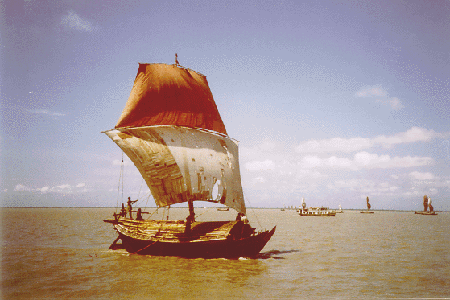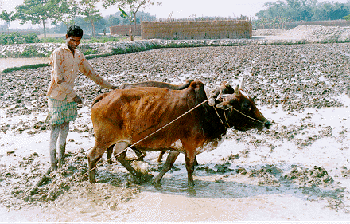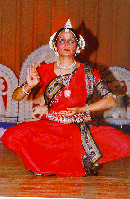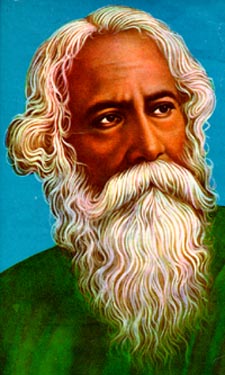Rabindranath Tagore: Sujit K. Bhattacharjee

Rabindranath Tagore: Sujit K. Bhattacharjee

Rabindranath Tagore (1861-1941) is the most eminent Bengali renaissance poet, philosopher, essayist, critic, composer and educator who dreamt of a harmony of universal humanity among the people of different origin through freedom of mind and spiritual sovereignty. He became the first-ever Asian writer to be awarded a Nobel Prize in 1913 for translated version of his cycle of song-poems, Gitanjali. His literary works transcend race, gender, religion, politics and geographic territory. He wondered throughout his life to reveal with his sensitivity the meaning of life and the universe. He felt, the most important need for humanity in the world, was freedom of mind regardless of nature, culture and race. W.B. Yeats described him, "Tagore was the product of a whole people, a whole civilization, immeasurably strange to us, and seems to have been taken up into this imagination; and yet we are not moved because of its strangeness, but because we have met our own image, as though we had walked inÖor heard perhaps for the first time in literature, our voice as in a dream". Tagore enjoyed worldwide homage for over more than any other living poet of the twentieth century, but soon after his death in 1941, the world has forgotten him entirely except in Bengal, his own nation of origin.
The overwhelming impression of Tagore in the hearts of Bengalis is immense. Even today, he has been most inspiration for a free mind and nourishment for millions and millions of Bengalis and Indians. Tagore spoke their mind in their own language, rhythm and very ordinary sentiments of every day life. They interpret any of their sentimental issues of suffering, joy, love and anger in any stage to that of Tagore by reciting verses from his poems, singing his songs, quoting dialogues from his plays, and citing opinions from his essays. He is called "Bishwa-Kabi", which means the poet of the world and is sometimes also called "Kabiguru", which means the guru of poets. India's first Prime Minister accepted Tagore as his "guru" and Mahatma Gandhi described him as "Great sentinel" His legendary and towering figure in millenium-aged literature of Bengal crossed its boundary the Bengali culture to India and all over the world. His genius enriched whatever it touched
Tagore once described his own Bengali family as the product of " a confluence of three cultures, Hindu, Mohammedan and British". This had influenced his outlook persistently nonsectarian, and so his two hundred books, which reveal the Indian cultural background as well as of the rest of the world. Though Tagore came from a Hindu family, it did not prevent the largely Muslim citizens of Bangladesh from choosing one of Tagore's songs ("Amar Sonar Bangla" which can be translated as " My Golden Bengal") as its national anthem.
Both Gandhi and Nehru expressed their appreciation of the important part Tagore
took in the national struggle. It is fitting that after independence, India
chose a song of Tagore " jana gana mana adhionayaka" which can be roughly translated
as "the leader of people's mind" as its national anthem. He may be the only
one ever to have authored the national anthems of two different countries.
Rabindranath Tagore is enormously popular in Spanish-speaking world. Tagore's
works had been extensively translated and widely reprinted. His books have sold
better than those of many Spanish-language poets (Young). Juan Ramon Jimenez
, a Nobel Prize winner in 1956, translated Tagore's work with most sympathy.
Jimenez, a poet, seemed especially responsive to Tagore's idealism and sensitivity
to nature's nuances, and who, in collaboration with his wife produced Spanish
versions of 22 Tagore's titles. Pablo Neruda also translated some of Tagore's
work. In Spain today poets still compete for the Rabindranath Tagore prize for
poetry. In contrast, in the rest of the world, especially in Europe and America,
the excitement that Tagore's writing created in the early years of this century
has largely vanished. The great enthusiasm with which his work was once quite
remarkably greeted is not much read now. Within the decade his popularity began
to decline, as is documented beyond question in book reviews and publishers'
annual reports. How could this have happened? Western preconceptions and misconceptions,
facile romanticizing, the intractable British-Indian conflict, and great changes
in literary taste all contributed. In the West today, Tagore is known to relative
few, and not all of those understand his immense significance as both literary
and a political figure (Lago).

Tagore's works include 28 volumes of poetry, stories, novels, operas, essays and diaries, 2,500 songs (still very popular in Bengal). Very little of his writing is available in adequate English translation. Faced with this diversity, arbiters have resorted to simplification. Much that might have endured had been killed by bad translation, often Tagore's own.
W. B. Yeats, in an introduction of Gitanjali said, "Mr. Tagore, like the Indian civilization itself, has been content to discover the soul and surrender himself to the spontaneity" and also added, "At times I wonder if he has it from the literature of Bengal or religion". The spiritual values of Hinduism were deep rooted in his ancestry and in his own long and hard-fought experience, and they found constant expression in every aspect of his extraordinary life.
Rabindranath Tagore was 14th of the 15 children of Maharshi Debendranath Tagore, from a reformed Hindu group called "Brahmo Samaj." Their family was affluent and devoted to art and culture. Many member of the family were involved in music, theatre, and writing and publishing of literary magazines. Tagore handed on to write poetry at the age of 13 and gave up formal study. At the age of twenty his first volume of collections of poems were published.
Of the many intellectuals of India, Tagore stands out above all, as the very symbol of the enlightened will for the freedom of India from self imposed social slavery, and for the deepest aspirations of the human soul. From Love to Nature, from social questions to religion and mysticism were revealed in most themes of his work. He wondered with his sensitivity the meaning of life and the universe. Tagore had reflected on the inner essence of Reality in many poems. For him, it was of the highest importance that people be able to live, and reason, in freedom. Nothing, perhaps expresses his values as clearly as a poem in Gitanjali:
Where the mind is without fear and the head is held high;
Where knowledge is free;
Where the world has not been broken up into fragments by narrow
domestic walls;
Where words come out from the depth of the truth;
Where tireless striving stretches its arms towards perfection;
Where the clear stream of reason has not lost its way into the dreary
desert sand of dead habit;
Where the mind is led forward by thee into ever-widening thought and action
Into that heaven of freedom, my Father, let my country awake.

As ambiguity about religious experience is central to many of Tagore's devotional poems, it makes them appeal to readers irrespective of their beliefs. Tagore reveals himself as one who is in an intimate relationship with nature and people's mind. "If Tagore was profoundly moved by the glorious insights of Upanishadic and Vedantic seers, he was no less appalled and pained by the inhumanity of casteism and the mindless muttering of heartless orthodoxy" (Raman 3). The English renderings of the poet's native creations opened up the flood gates of world recognition. Not only Yeats and Ezra pound and T. S. Eliot, not only Bernard Shaw and Burtrand Russel and Albert Einstein, but scores of other writers and intellectuals, and millions of more common folk, were touched in due course by this melodious Eastern sage (Raman)
Gandhi was Tagore's great contemporary with whom he frequently and publicly disagreed on variety of subjects, including nationalism, the importance of cultural exchange, the role of rationality and of science, and the nature of economic and social development (Sen). There were clear and consistency in those differences, with Tagore pressing for more room for reasoning, and for a less traditionalist view, a greater interest in the rest of the world and more respect for science and for the objectivity generally. Tagore knew that he could not have given India the political leadership that Gandhi provided, and Tagore was never stingy in his praise for what Gandhi did for the nation. It was Tagore, who popularized the term "Mahatma"- great soul as a description of Gandhi. Unlike Gandhi, Tagore did not feel that all Indians were his own flesh and blood. Tagore worked not on flesh and blood, but on the minds of countless individuals. He stopped at the thresholds of thousands and thousands of minds, not just in India, but worldwide, and entered them (Dutta 2). Mahatma Gandhi has received incomparably more attention outside India and within much of India itself.
Tagore was described as "a poet of excellence," for his inborn capacity to use the rhyme and rhythm with their inner melody and original creativity. His verses were so fluent in words and music was soothing in its natural tone that as if they came from the heaven to the earth to express love and unity between human and nature (Ramon). His fame rested partly on his charisma-a world that might have been invented for Tagore-which was experienced at first hand in many countries during Tagore's extensive travels after 1912. Many people were even reminded of Christ. But more important was that Tagore's basic ideas expressed in lectures before the world's greatest universities and through his many books survived both translation and, frequently, the severest scrutiny.
Tagore was against the sluggishness, the apathy and the torpor of those who in India had manufactured chains of slavery and humiliation that he invoked compensating ideals of the West, for the restoration of rights of man. And he wished to take over certain permanent elements of Western civilization, such as the effort to evolve the "complete man" (Anand). But he warned his countrymen against accepting those evils which the West has brought through the application of the great knowledge-the conquest of the vast spaces of the world and the upturning of man's moral balance, the liquidation of his human side under the shadow of the soulless organization of the machine. Tagore exhorted, "You must apply your Eastern Mind, your spiritual strength, your love of simplicity, your recognition of social obligation in order to cut out a new path."
Tagore stressed his international concerns, and shrewdly denounced the excesses of nationalism not only in India, but also in Japan, China, and the West. In October 1921, Tagore published his first essay on Gandhi and non-cooperation, "The Call of Truth", which argued that truth was of both the head and the heart; while Gandhi stressed inner truth and love, he was fostering blind, unquestioning obedience to his message if charka (the spinning wheel-Gandhi's symbol of India's self-reliance on her own cottage industry) by one and all. Tagore wanted Indian economists and leaders to fully
nvestigate whether this made any economic sense. Tagore had his doubts and
he resented that all were told to simply "spin and weave."
Tagore also objected to the burning of foreign cloth because it was foreign.
Gandhi stressed the need for Indian self-sufficiency in every sphere of life,
while Tagore saw the need for international cooperation and sharing. In the
modern age, the poet insisted, India must learn from abroad, for example, in
science, as well as look inward. Tagore believed that India had a message for
the world, but he thought India must also incorporate others' messages into
her own cultural repertoire. Like Gandhi, Tagore believed that inner swaraj
and cultivation of the self was vital, and some aspects of Gandhi's constructive
program were not foreign to the oft-repeated teachings of village reconstruction
and paths to Indian revitalization which Tagore had put forward (Chakraborty).
Throughout his adult political life, Rabindranath Tagore had been critical
of using force, man against man, class against class, nation against nation.
He had sharp words for the Japanese when he visited Japan at the time of the
First World War and in the late 1930s; he was hostile to their use of force
in China. On the political left in India, there were strong anti-fascist sentiments
as well as anti-imperialism views. As yet there was no problem of opposing both
German and Italian fascism and British imperialism (Chakraborty).
While introducing a new edition of Tagore's Nationalism (1917), E.P. Thompson
wrote in 1991, "More than any other thinker of his time, Tagore had a clear
conception of civil society, as something distinct from and of stronger and
more personal texture than political or economic structure". In 1919 Tagore
made a public protest by repudiating his knighthood which had been conferred
on him by the British Crown and became the first Indian to condemn the Amritsar
massacre carried out by the British Government (Dutta). As much as he wanted
his people of India to be left free by the British, he supported and praised
Gandhi for his leadership. Although a good friend of Gandhi, most of the time
Tagore stayed out of the politics. He did not support the idea of nationalism
and militarism from the point of view of a universal humanity. His doctrine
was to spread the spiritual values among the people and create a new world culture
in multi-culturism, diversity and tolerance. When Gandhi took care of the political
sector by nearing every level of Indian public, Tagore served the spiritual
and creative side to his countrymen, and more accurately the whole world.
His unity of thought and action, which he foreshadowed in his writing before the turn of the century, became real during the tragic partition of Bengal, by the British authorities, in the year 1905. In order to create a real sense of brotherhood among the people, he suggested the use of "Rakhi Bandan," the tying of the ancient ochre-colored thread round the wrist. This simple ceremony spread everywhere, and the poor and the rich joined together, not only in their hearts but in the stoppage of all work, as a protest against authority.
Rabindranath Tagore founded Shanti Niketan (Abode of Peace), a school where educational pattern was reformed to create a bond between the knowledge and the nature. Teachers and students were brought closer to each other. Since Shanti Niketan was established, it has attracted overwhelming international attention and presented many talents, artist, visionary and world leader. Indira Gandhi and Satyajit Ray, both studied there and mentored by Tagore. While in Shanti Niketan Tagore also developed a project for rural development in collaboration with foreign funds. While expressing its motive, Tagore said that imposed solutions do not last-the villagers are waiting for the living touch of creative faith and not for the cold aloofness of science which uses efficient mechanisms for extracting statistics only.
Rabindranath had a deep interest in protecting the environment.
His concern was particularly about the deforestation, and so he initiated a
festival "Tree-planting" (Vriksha-ropon), as early as 1928, which might self
motivate people. Tagore's interests didnot lie in the fields of poetry and humanism
only, it extended to the contemporary scientific achievements. He insisted that
science, which he studied and wrote about from an early age, must, in its application
to society, serve society, and not vice versa. He had personal contact with
eminent Bengali scientist, physicist and biophysicist J.Bose, and Einstein.
In 1930, talking to Einstein, Tagore told him, "This world is a human world-the
scientific view of it is also that of the scientific man." Though Einstein did
not agree, some distinguished scientists now see Tagore's point. One of them,
Ilya Prigogine, a Nobel laureate in chemistry, claimed in 1984: "Curiously enough,
the present evolution of science is running in the direction stated by the great
Indian poet."
Rabidranath Tagore's profuse legacy of creativity, freedom, relentless striving
towards perfection, harmony amongst people and harmony of people with nature,
the unbounded joy of life which has discovered its own rich resources-these
are a priceless gift to Bengal, India, and indeed, the world. In the Bengali
nation Rabindranath Tagore will be paid tribute, honored, remembered and celebrated
as long as their language uttered and culture survived, and cherished their
freedom of mind.

Rabindranath Tagore
Bibliography
Anand, Mulk Raj, Saumyendranath Tagore, et al. Rabindranath Tagore- A Centenary
Volume.
Calcutta: Tagore Centenary Citizens' Committee, 191961.
Bernard, Theos. Hindu Philosophy. New York: Greenwood Press, 1968.
Chakravarty, Amiya. Rabindranath Tagore- In Conversation with Albert Einstein.
Online. July
1, 1998. http://www.acsu.buffalo.edu/~sc4/Thakur.html
Chatterjee, Monish R. Rabindranath Tagore- Sadhaka of Universal Man, Baul of
Infinite Songs.
Online. July 1, 1998. http://www.cs.brockport.edu/~smitra/tagore.html
Chatterjee, Sohang. Homage to Gurudev Rabindranath Thakur. Online. July 9, 1998.
http://www.acsu.buffalo.edu/~sc4/Thakur.html
Chaudhury, Prabas Jiban. Tagore on Literature and Aesthetics. Calcutta: Rabindra
Bharati, 1965.
Chethimattam, John B. Consciousness and Reality. London, Dublin, and Melbourne:
Geoffrey Chapman, 1971.
---. Patterns of Indian Thought. London, Dublin, and Melbourne: Geoffrey
Chapman, 1971.
Coomaraswamy, Ananda K. Recollection, Indian and Platonic. Connecticut: Supplement
to the Journal of the American Oriental Society, Number 3 April-June 1944.
Dutta, Krishna, and Andrew Robinson. Rabindranath Tagore. New York: St. Martin's
Press, 1997.
---. Rabindranath Tagore- The Myriad-Minded Man. London: Bloomsbury Publishing
Limited, 1995.
---. Selected Letters of Rabindranath Tagore. Cambridge, U.K.: Cambridge University
Press, 1997.
Fort, Andrew O. The Self and its States. Delhi: Motilal Banarsidass, 1990.
Gardner, Howard. Frames of Mind. New York: Basic Books, 1993.
Ghose, Sisirkumar. The Later Poems of Tagore. London: Asia Publishing House,
1961.
Ghosh, J.C. Bengali Literature. London: Geoffrey Cumberlege, 1948.
Hampson, Thomas. Rabindranath Tagore(1861-1941 ). I Hear America Singing. Online.
July 2, 1998. http://web-cr02.pbs.org/wnet/ihas/poet/tagore.html
Henry, Danielson. The Essence of Supreme Truth. Leiden: dNisaba, 1980.
Herman, A.L. A Brief Introduction to Hinduism. San Francisco: Westview Press,
1991.
Herrnstein, Richard J., and Charles Murray. The Bell Curve. New York, London,
Toronto, Sydney, Tokyo, and Singapore: The Free Press, 1994.
Horgan, John. The End of Science. New York: Broadway Books, 1997.
Howard, Pierce J. The Owner's Manual for the Brain. Texas: Leornian Press, 1994.
Iyengar, K.R. Srinivasa. Rabindranath Tagore- A Critical Introduction. Delhi,
Bangalore, and Jalandar: Sterling Publishers Private Limited, 1985.
Lago, Mary M. Rabindranath Tagore. Boston: Twayne Publishers, 1976.
Lago, Mary, and Ronald Warwick. Rabindranath Tagore- Perspectives in Time. London:
The Macmillan Press Limited, 1989.
Matilal, Bimal Krishna. Epistemology, Logic, and Grammar. Paris: The Hague,
1971.
Mukhopadhyaya, Dhurjatiprosada. Tagore- A Study. Calcutta: Manisha Granthalaya,
1972.
Murty, Satchidananda K. Revelation and Reason in Advaita Vedanta. New York:
Columbia University Press, 1959.
Raman, V.V. Reflections on Gitanjali. Based on a Talk given at the Bengali Association
of Greater Rochester. Online. July 9, 1998. http://www.cs.brockport.edu/~smitra/tagore.html
Rhys, Ernest. Rabindranath Tagore- A Biographical Study. London: Macmillan and
Co., Limited, 1915.
Seksena, S.K. Nature of Conciousness in Hindu Philosophy. Delhi, Varanasi, and
Patna: Motilal Banarsidass, 1971.
Sen, Sachin. The Political Thought of Tagore. Calcutta: General Printers and
Publishers Limited, 1947.
Sharma, B.N.K. History of the Dvaita School of Vedanta and its Literature. Delhi,
Varanasi, and Patna, 1981.
Sharma, Dhirendra. The Negative Dilectics of India. Michigan: Michigan State
University, 1970.
Sternberg, Robert J. Beyond IQ. Cambridge, Mew York, New Rochelle, Melbourne,
and Sydney: Cambridge University Press, 1985.
Tagore, Rabindranath. The Post Office. Trans. Krishna Dutta. Shamon: Irish University
Press, 1971.
---. Gitanjali (Song Offerings). New ed. New York: The Macmillan Company, 1920.
---. Selected Works. Ed. Amiya Chakravarty. Trans. Mary Logo, Tarun Gupta, and
the editors. Connecticut: Greenwood Press, 1977.
---. Three Companions. Trans. Sujit Mukherjee. Hyderabad: Sangam Books Limited,
1992.
---. Later Poems of Rabindranath Tagore. Trans. Aurobindo Bose. New York: Funk
and
Wagnalls, 1976.
---. I Won't Let You Go-Selected Poems. Trans. Ketaki Kushari Dyson. Newcastle
upon Tyne: Bloodaxe Books Limited, 1991.
Things Fall Apart-Demise of IBO Tribe
In the novel Things Fall Apart, Chinua Achebe demonstrates how the spirit
of the main character, Okonkwo, was effectively crushed in the conflict of moral
issues and his tribal culture. Also, he describes how the entrance of the white
society with their comparatively civilized ideology and religion into their
village caused massive destruction of family ties, social traditions, and tribal
unity.
Umuofia was a community of the Ibos, based on ancient theology and primitiveness,
but its members still shared dignity and humanity according to the Umuofians.
They did not desire infiltration of a foreign invasion either physically or
ideologically. The Ibo people of Umuofia were sharing the happiness of a peaceful,
prosperous and respectful community by achieving a balance between materialism
and spirituality. The materialistic achievements were in the socioeconomic level,
such as in agricultural productivity. Spirituality was in the aspect of accepting
their fate in life or 'Chi'. The import of civilization from Europe by the missionaries
interrupted the natural flow of their Ibo culture and caused the ultimate turmoil
in their society.
Achebe reflected the disastrous effect of the new civilization on Okonkwo. Okonkwo,
despite his shaky ancestral background, became one of the most important and
respected men among the Ibo. His economic and social prosperity was due to his
diligence, hard work and perseverance. His emotional turmoil started when he
had to kill the innocent boy 'Ikemefuna' which caused Okonkowo's spiritual deflection,
and he lost faith in the rest of his tribal society. This was definitely a drawback
of the tribal rule.
When the missionaries penetrated in Umuofia with Christianity, a massive destruction
occurred in the Ibo community and to their spiritual wellbeing. The new 'civilization'
ripped apart Okonkwo's family. His own son, Nowye, accepted God and creator
through Christianity. Okonkwo believed Nowye was weak for having such beliefs.
Finally, Okonkwo could not deal with the things happening around him. His fear
of losing ground in his own village, tribe and family, and spiritual defeat
to the white man demoralized him totally. In his uncertainty and bitterness
he killed the messenger (204). Soon after, having no other alternative, he killed
himself too. In a way, the novel depicted the demise of an old society and their
beliefs in the verge of a new civilization.
Sujit K. Bhattacharjee
Living spiritually in a timeless zone

WHAT IS TIME? Is it a clock with a small and big hand? Or a digital display of glittering numbers? Clicking all day and night. Or, looking at the sun going down in the west in Red Fire Farm. Anchee Min waits for the chance to be in bed with Yan with an excuse of cold night under the mosquito net. Or could it be the buffaloes turning the water wheels in Kafr El Teen and Zakeya�s stare into the darkness of limitless night. And the Mayor asking Zeinab to take off her galabeya. We might see the time flowing with the water in the Nile. Clicking its arms for Kafrawi, Zakeya and others living on its banks.
Does time stop in Grand Central where one can be lost in some underground platform and time moves again in the ride from the city crowd to Bill Gray�s hidden shelter? Can we touch time? Feel it or move it? For sure, time moves everything, the earth, the sun and lives. So what is time? Is it forgetting or remembering things�depends on our memory? Is that why we do not forget recent facts and we only forget time steps in with its big foot in-between? Without time we could be immortal. Does it mean that time is our enemy? Time could be in our favor if it was short enough that allows us to go backward to the happiness of the past.
In prison, time is the wall, the barricades, guards and inmates. Real time is freedom�can travel zoneless, between past, present and future. Again, time dominates over our pride to fall apart and make Okonkwo lose his Ibo tribe�s main mantra. Okonkwo can dream about Umufia�s past�as Ammu dreams of the cheerful man, the God of loss, the God of small things.
Could we live in timeless space or in time without shape? Or could we give time some free shape and dimension? A line, a square, circular, upward, downward, back and forth and float ourselves into it so that we can also spread our capacity with the time. Who knows, if spiritual enough we couldbe beyond the time limit?

A poem translated by the author from from the original Bengali collection Gitanjali which was submitted to be read by the Nobel Award Committee.
Time is endless in thy hands, my lord.
There is none to count thy minutes.
Days and nights pass and ages bloom and fade like flowers.
Thou knowest how to wait.
Thy century follow each other perfecting
a small flower.
We have no time to loose, and having no time
we must scramble for our chances.
We are too poor to be late.
And thus itis that time goes by while I give it to
every querulous man who claims it,
and thine altar is empty of all offerings to the last.
And at the end of the day I hasten in fear
lest thy gate be shut;
but I find that yet there is time.